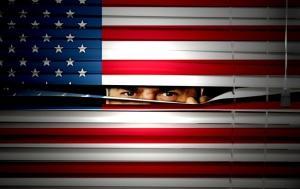
[courtesly Google Images]
Russia Today“Former NSA chief Michael Hayden told television host Bob Schieffer of CBS’ Face the Nation that . . . not only does ending the NSA’s domestic surveillance programs seems unlikely, but he images those endeavors could expand in scope during the coming years.”
I recently went to court with a friend. He was being tried for a class-C misdemeanor for allowing the grass to grow too high and storing some junk in his backyard—even though he had a privacy fence.
Unfortunately, my friend was found guilty, but I was still pleased by the courtroom “drama” because it seemed fair. My friend lost but he wasn’t railroaded. He lost largely because of his own lack of preparation.
Nevertheless, during the voir dire selection of the jury, I saw something that made me laugh and even gave me some real hope. I saw something in the jurors’ comments that may explain why government is so determined to spy on all of us:
The city brought in 20 potential jurors. The prosecutor asked them a number of questions, including whether they’d ever had any tickets from the city’s code enforcement officers. At least 8 potential jurors spoke out that, Yes they’d been ticketed by code enforcement—and they didn’t think it was fair.
Some of ‘em were visibly upset with government.
After the prosecutor asked about city code enforcement tickets, three more potential jurors started complaining about traffic tickets or red-light camera tickets they’d received that they also thought were unjust.
I didn’t count them at the time, but in retrospect, I’d bet that at least half of the 20 potential jurors had an ax to grind with the city government.
That surprised me because I’ve attended a couple of other voir dire jury selection procedures in the past and I’ve never before seen potential jurors willing to say “boo” to the prosecutor or implicitly criticize government as unfair. But I saw that happen for the first time at my friend’s trial.
That tells me that: 1) the natives are, at least, “restless”; and 2) it may be increasingly difficult for our growing police state to recruit jurors who aren’t biased against the government.
Result? Fewer convictions.
Or, as in my friend’s case, lower fines. The jury could’ve fined him $2,000 but instead ordered him to pay the minimum fine of $300. I’m sure the cost of the trial cost more than $300. The city (which is a business) lost its butt on that case.
Thus, jury nullification may be about to become quite popular.
If that jury pool is any indication, the number of Americans who are upset about being subjected to too much taxation, too much inflation and too much regulation is substantial and growing. Most of us will grin and bear “big government,” but some will make it their business to “get even” by voting “not guilty” in court.
I’m sure government is aware of that potential bias. I’m sure government knows that most Americans are just about fed up with big government.
I doubt that government is overly perturbed about losing a few court cases to juror biases.
But I’ll bet government is concerned that a handful of disgruntled citizens may do more than vote against government in jury trials. I’ll bet that government is concerned that some Americans are so angry over big government that they may even resort to violence against the government. I doubt that almost anyone in America hasn’t privately spoken out against big government. Anti-government sentiment may not yet be public, but it appears to be growing.
If anti-government sentiment drives some to commit violence, government will describe such attacks as “domestic terrorism” but perpetrators may claim such attacks are “resistance to tyranny”. Before 9/11, virtually every American would agree with the “domestic terrorism” description. Today a lot of Americans might be tempted to go with “resistance to tyranny”.
Government’s problem is that there are so many Americans who are angry at big, overly-intrusive government, that government is beginning to fear all of us. That’s why government must either spy on all of us—or reduce the size of the police state that’s making a lot of people mad.
Government has upset so many Americans with laws, rules and regulations that are arbitrary and contrary to our best interests that government can no longer trust us. Government knows it, and therefore feels compelled to spy on us and intrude into our lives.
In the end, people don’t get angry at government unless government first intrudes unfairly into their lives. Insofar as government continues to grow, spy and intrude, more and more Americans will become increasingly critical of government.
I don’t expect government to voluntarily reduce its size or obtrusiveness. I therefore agree with former NSA chief Michael Hayden’s prediction that we can expect government spying on Americans to grow.
We can also expect growth in the number of Americans who are mad at government.
And we can wonder how long both government spying and anti-government sentiments can grow without causing a real conflict.
